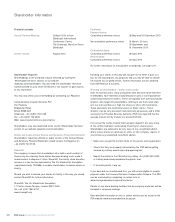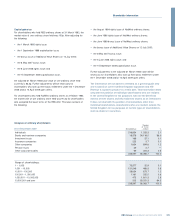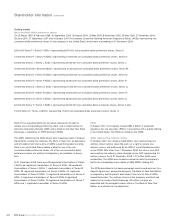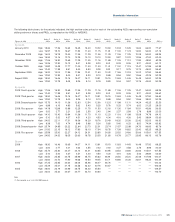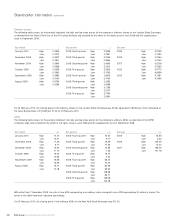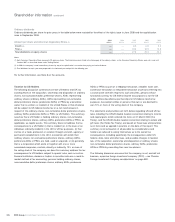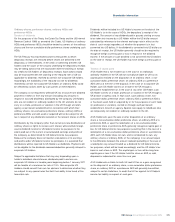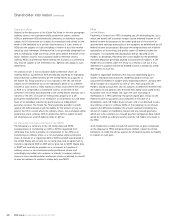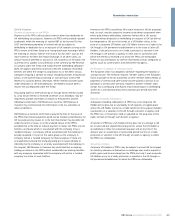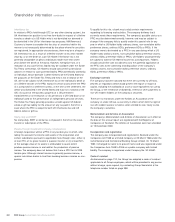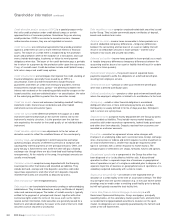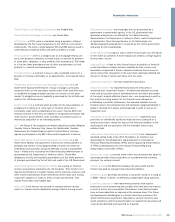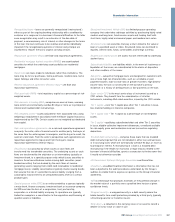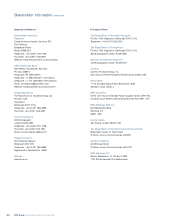RBS 2009 Annual Report Download - page 381
Download and view the complete annual report
Please find page 381 of the 2009 RBS annual report below. You can navigate through the pages in the report by either clicking on the pages listed below, or by using the keyword search tool below to find specific information within the annual report.
Shareholder information
379RBS Group Annual Report and Accounts 2009
Ordinary shares, preference shares, ordinary ADSs and
preference ADSs
Taxation of dividends
For the purposes of the Treaty, the Estate Tax Treaty and the US Internal
Revenue Code of 1986 as amended (the Code), US Holders of ordinary
ADSs and preference ADSs should be treated as owners of the ordinary
shares and the non-cumulative dollar preference shares underlying such
ADSs.
The US Treasury has expressed concerns that parties to whom
depositary receipts are released before shares are delivered to the
depositary, or intermediaries, in the chain of ownership between US
holders and the issuer of the security underlying the depositary receipts
may be taking actions that are inconsistent with the claiming of foreign
tax credits for US holders of depositary receipts. Such actions would
also be inconsistent with the claiming of the reduced rate of US tax
applicable to dividends received by certain non-corporate US holders.
Accordingly, the availability of the reduced tax rate for dividends
received by certain non-corporate US holders of ordinary ADSs could
be affected by actions taken by such parties or intermediaries.
The company is not required to withhold UK tax at source from dividend
payments it makes or from any amount (including any amounts in
respect of accrued dividends) distributed by the company. US Holders
who are not resident or ordinarily resident in the UK and who do not
carry on a trade, profession or vocation in the UK through a branch,
agency or permanent establishment in connection with which their
ordinary shares, non-cumulative preference shares, ordinary ADSs or
preference ADSs are held, used or acquired will not be subject to UK
tax in respect of any dividends received on the relevant shares or ADSs.
Distributions by the company (other than certain pro rata distributions of
ordinary shares or rights to receive such shares) will constitute foreign
source dividend income for US federal income tax purposes to the
extent paid out of the current or accumulated earnings and profits of
the company, as determined for US federal income tax purposes.
Because the company does not maintain calculations of its earnings
and profits under US federal income tax principles, it is expected that
distributions will be reported to US Holders as dividends. Payments will
not be eligible for the dividends-received deduction generally allowed to
corporate US holders.
Subject to applicable limitations that may vary depending upon a
holder’s individual circumstances, dividends paid to certain non-
corporate US Holders in taxable years beginning before 1 January 2011
will be taxable at a maximum tax rate of 15%. Non-corporate US
Holders should consult their own tax advisers to determine whether they
are subject to any special rules that limit their ability to be taxed at this
favourable rate.
Dividends will be included in a US Holder’s income on the date of the
US Holder’s (or in the case of ADSs, the depositary’s) receipt of the
dividend. The amount of any dividend paid in pounds sterling or euros
to be taken into income by a US Holder will be the US dollar amount
calculated by reference to the relevant exchange rate in effect on the
date of such receipt regardless of whether the payment is in fact
converted into US dollars. If the dividend is converted into US dollars on
the date of receipt, the US Holder generally should not be required to
recognise foreign currency gain or loss in respect of the dividend
income. If the amount of such dividend is not converted into US dollars
on the date of receipt, the US Holder may have foreign currency gain or
loss.
Taxation of capital gains
A US Holder that is not resident (or, in the case of an individual,
ordinarily resident) in the UK will not normally be liable for UK tax on
capital gains realised on the disposition of an ordinary share, a non-
cumulative dollar preference share, an ordinary ADS or a preference
ADS unless at the time of the disposal, in the case of a corporate US
Holder, such US Holder carries on a trade in the UK through a
permanent establishment or, in the case of any other US Holder, such
US Holder carries on a trade, profession or vocation in the UK through a
UK branch or agency and, in each case, such ordinary share, non-
cumulative dollar preference share, ordinary ADS or preference ADS is
or has been used, held or acquired by or for the purposes of such trade
(or profession or vocation), carried on through such permanent
establishment, branch or agency. Special rules apply to individuals who
are temporarily not resident or ordinarily resident in the UK.
A US Holder will, upon the sale or other disposition of an ordinary
share, a non-cumulative dollar preference share, an ordinary ADS or a
preference ADS, or upon the redemption of a non-cumulative dollar
preference share or preference ADS, generally recognise capital gain or
loss for US federal income tax purposes (assuming that in the case of a
redemption of a non-cumulative dollar preference share or a preference
ADS, such US Holder does not own, and is not deemed to own, any
ordinary shares or ordinary ADSs of the company) in an amount equal
to the difference between the amount realised (excluding in the case of
a redemption any amount treated as a dividend for US federal income
tax purposes, which will be taxed accordingly) and the US Holder’s tax
basis in such share or ADS. This capital gain or loss will be long-term
capital gain or loss if the US Holder held the share or ADS so sold,
disposed or redeemed for more than one year.
A US Holder who is liable for both UK and US tax on a gain recognised
on the disposal of an ordinary share, a non-cumulative dollar preference
share, an ordinary ADS or a preference ADS will generally be entitled,
subject to certain limitations, to credit the UK tax against its US federal
income tax liability in respect of such gain.





